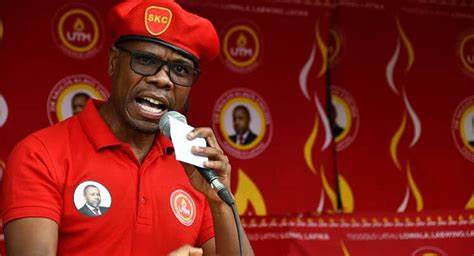Tensions between the family of the late Vice President Saulos Klaus Chilima and his party, UTM, have reached a visible breaking point after the family decisively told the party off and to stay away from the official and private memorial service scheduled for Tuesday, June 10 at the Chilima home in Nsipe, Ntcheu.
In a clear message communicated to the UTM leadership, the Chilima family has opted to hold a strictly invitational memorial service, which will be devoid of political speeches or party influence, effectively yet again shutting out UTM’s attempts to publicly brand the memorial as a party event.

UTM spokesperson Felix Njawala confirmed the development, stating that while UTM had initially planned to jointly hold the memorial with the family, they were told in no uncertain terms that the event will be for family, close friends, and religious leaders only. UTM will not be involved.
“We respect the family’s wishes. As a party, we will proceed to hold our own commemorative events later in the day, including a music show,” said Njawala, referencing a lineup of performers such as the Black Missionaries, which the party has engaged as a headliner artist for the occasion.
This development is yet another blow to UTM’s image, which has been struggling to realign its identity in the aftermath of Chilima’s tragic death. The clear dissociation by the Chilima family is being viewed by many observers as a calculated rebuke of the party’s recent conduct and its attempts to ride on Chilima’s legacy without meaningful engagement with the family.
This is the second time the Chilima family has shown discomfort with how UTM has handled its late leader’s memory.
In early May, Dr. Ben Chilima, the brother to the late Vice President, issued a strong worded statement asking the Chilima family to stay away and refrain from using the name of the late UTM leader and founder and his legacy for political gains.
“Dr. Saulos Chilima died a UTM member, but he was a husband, father, son, and brother first. His memory must be respected as such,” Dr Ben Chilima was quoted publicly as saying.
Dr. Ben Chilima’s statement was widely interpreted as a diplomatic yet firm warning, especially by individuals now attempting to position themselves as heirs to his political capital without consultation or blessing from the family.

Meanwhile, Mary Chilima, the widow of the late Vice President, has announced her own plans to commemorate her husband in a way that reflects his values. Mrs. Chilima will use the day to donate medical supplies to Ntcheu District Hospital under the auspices of the Saulos Klaus Chilima (SKC) Foundation, a charity she officially launched recently.
The Foundation, formed to honor her late husband’s lifelong commitment to public service and youth empowerment, has already started receiving modest donations from well-wishers.
The initiative has been widely praised for shifting the memorial focus from political theater to tangible impact.
With the family firmly controlling the narrative around Chilima’s memory, UTM appears increasingly lost, lacking both a clear leadership structure and political direction. Since Chilima’s death, the party has struggled to project a credible successor, with various factions jostling for control and relevance.
Internal rifts have deepened, with party insiders accusing some members of attempting to use Chilima’s death as a political springboard. Observers believe the family’s rejection of UTM’s co-organizing roleis adirect reaction to these internal squabbles, which have left the once-energetic political outfit drifting aimlessly.
What is emerging is a classic case of clashing legacies — one rooted in family, dignity, and quiet service, and the other rooted in opportunistic politicking and premature succession battles. The Chilima family seems determined to safeguard SKC’s memory from being reduced to a political pawn, while UTM remains desperate to maintain relevance through symbolic association.
Political analysts have warned that if UTM fails to read the room and refocus its strategy, it may end up alienating more of the support base that was drawn to Chilima’s personal charisma and not necessarily to the party structure.
The events surrounding the memorial arrangements are exposing deep fissures and unresolved tensions within and around UTM. The very fact that the family had to impose strict limits on who attends their private memorial underscores how fragile the relationship has become between them and the political establishment Chilima helped build.
“If a party can’t respect the wishes of a grieving family, what moral authority does it have to lead a grieving nation?” asked one political commentator on X (formerly Twitter).
With just days to go before the June 10 anniversary of the tragic plane crash, UTM now faces a sobering reality — they may own the name, but not the legacy.
As the country prepares to reflect on the life and tragic death of one of its most promising political leaders in recent memory, all stakeholders — particularly those in politics — must demonstrate humility and respect for the mourning process.
The Chilima family’s move to tell the UTM off should serve as a model for how Malawi should approach national mourning — with decency, dignity, and an eye on legacy, not the next campaign rally.








